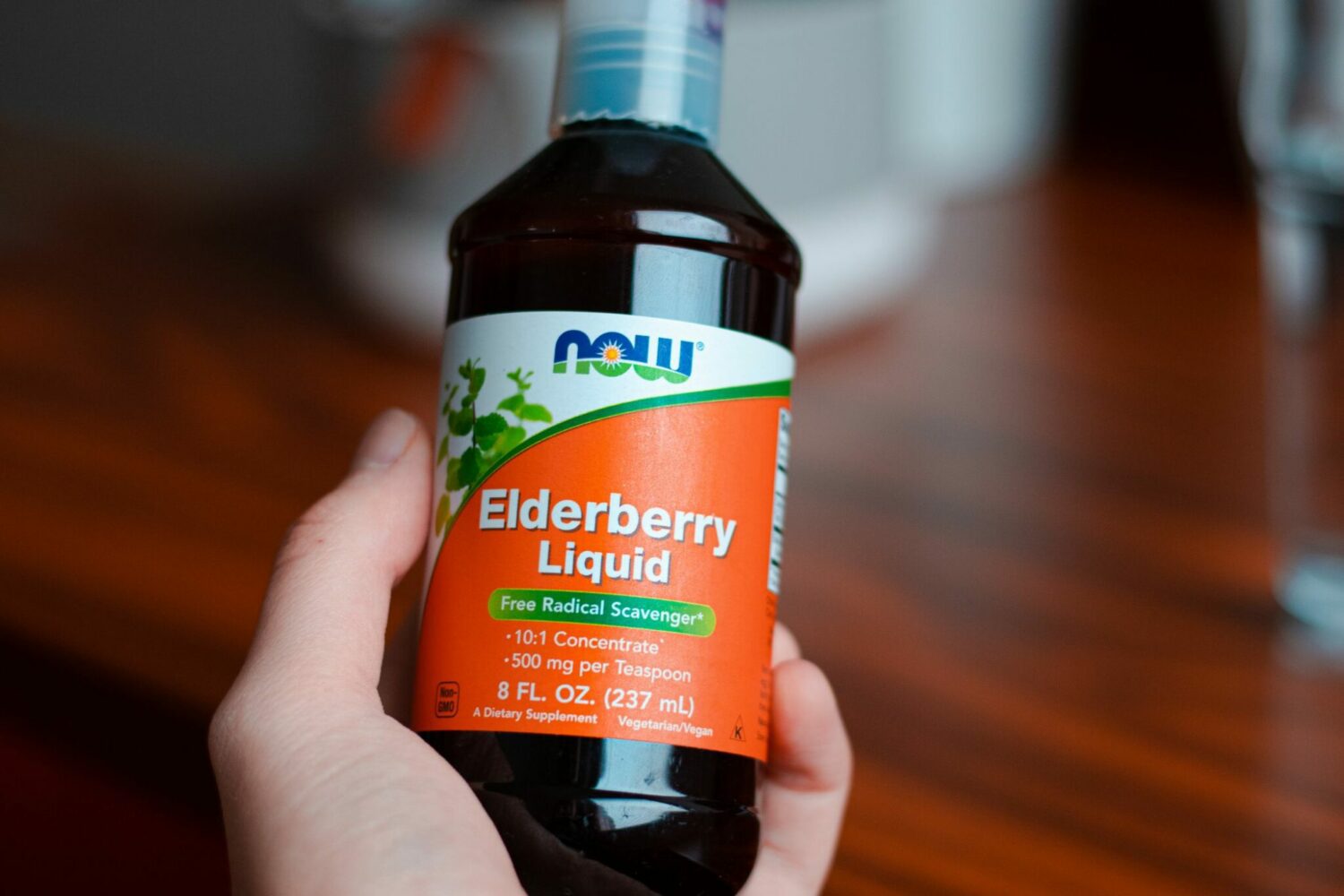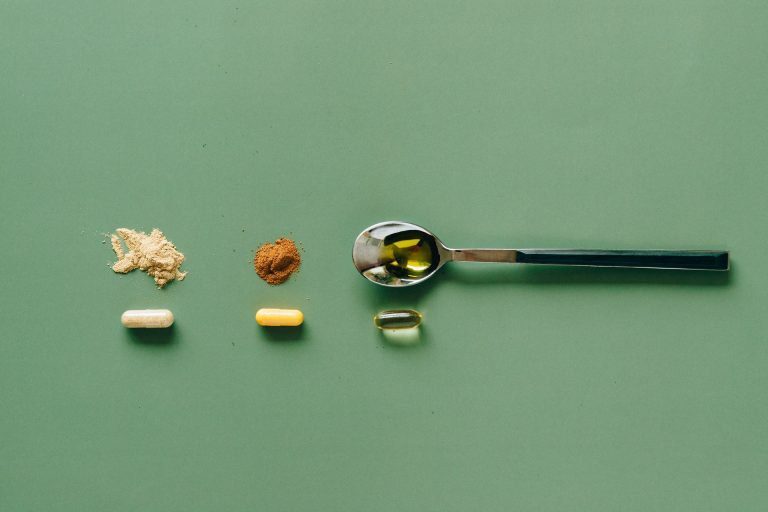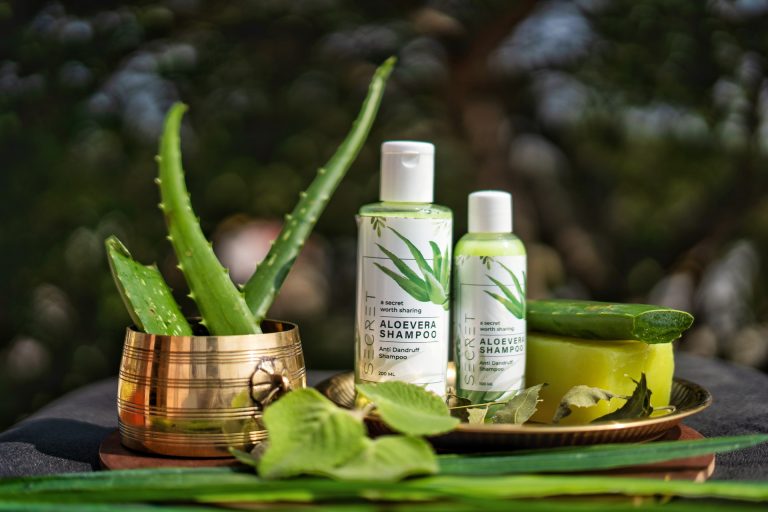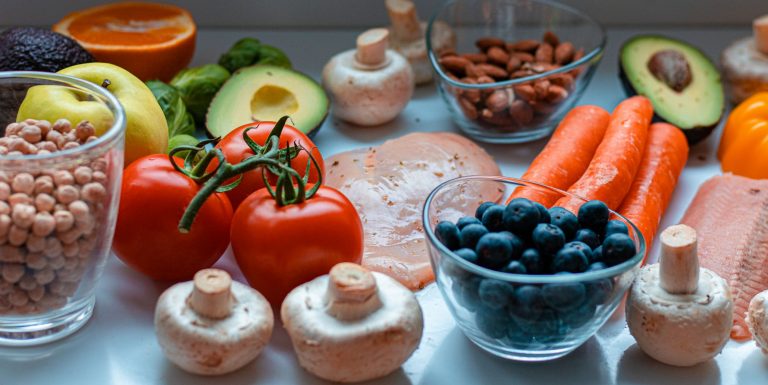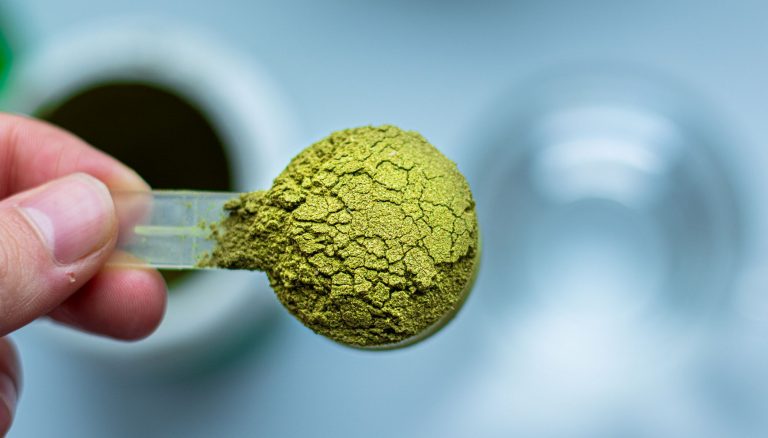10 Health Benefits of Elderberry on Immunity: Fight the Flu, Cold & Inflammation
History and Origin
Elderberry is a plant of the Adoxaceae family, native to Europe, Africa, and Asia. It is a tall tree (up to ten meters), its roots and bark are known to be toxic, and it has leaves, elderflowers, and berries.
There are many benefits of elderberry. It has been used to treat symptoms of cold and flu, it is an antioxidant powerhouse that can clean out the respiratory tract, and improve digestion and heart health. Elder may improve the immune system and assist in fighting bacterial and viral infections.
- Immunity boost is also one of the main benefits of supplementing with mushrooms like Lions Mane, Cordyceps, and even nootropics like Bacopa Monnieri. Some of them are anti-inflammatory, and antibacterial and may aid in neuroprotection.
Three Types of Elderberry
There are three main types of Elderberry, the most famous and used being Sambucus Nigra, mostly used for medicinal purposes in different forms such as liquid tinctures, gels, extracts, teas, and jams. Elderberries have rich blue-black color due to their anthocyanidins dominance, as in wine or dark chocolate.
Be cautious if using, consuming, or cooking this plant by yourself since it is known for its poisonous and toxic effects due to the presence of cyanogenic glycosides in roots, branches, twigs, seeds, leaves, and berry skin. It may cause diarrhea vomiting, nausea, weakness, and abdominal cramps, so unless you are an expert, make sure to use tested products.
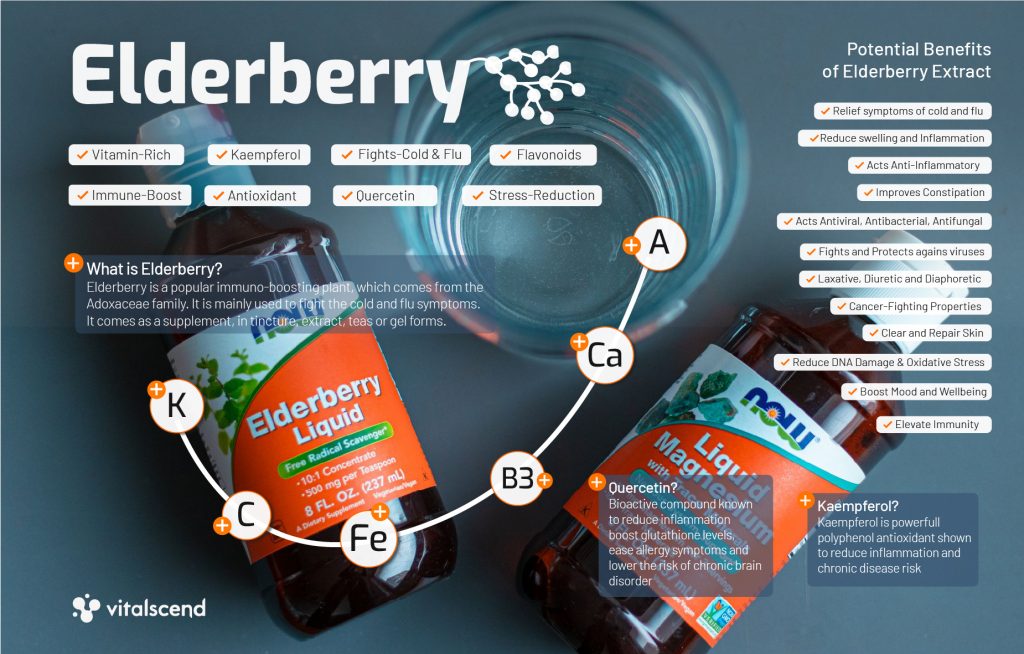
Nutrition Profile of Sambucus Nigra
Berries of Sambucus Nigra are full of water (80%), having 18% carbohydrates and less than 1% of fat and protein combined.
It has an exceptional nutritional profile, high in vitamin C, vitamin B6, and Iron, also rich in bioflavonoids, polyphenols, and antioxidants.
Vitamins and Minerals
Vitamins and Minerals present in raw Elderberry per 1 cup measuring 145g. (1)
| Vitamins | Minerals |
| niacin 0.7mg (4% DV) | Iron 2.3g (13% DV) |
| thiamin 0.1mg (7% DV) | phosphorus 56.6mg (6% DV) |
| vitamin A 870IU (17% DV) | potassium 406mg (12% DV) |
| vitamin C 52.2mg (87% DV) | calcium 55.1 mg (6% DV) |
| riboflavin 0.1mg (5% DV). |
Antioxidants and Bioactive Compounds
Elderberry is rich in flavonoids, high-antioxidant profile ensures to protect from oxidative damage. It contains flavones like kaempferol, isorhamnetin, and quercetin. In comparison to its berries, leaves have higher flavonol content. (2)
Quercetin can boost glutathione levels, which in turn affects inflammation since it is one of our body’s master antioxidants. (3) Kaempferol, a powerful polyphenol antioxidant found in kale, beans, and elder can act upon the endocannabinoid system which can be beneficial for lowering inflammation. (4)
Now, this plant is so powerful, not because of its bioactive components by itself, but mostly because when you put them together they can work synergistically to recognize, attack the virus and help the body protect itself. Those anti-inflammatory effects were examined, so quercetin and kaempferol were shown to inhibit nitric oxide synthase, cyclooxygenase-2, and reactive C-protein. (5)
Elderberry Health Benefits
1. Relief symptoms of Cold and Flu
Black Elder is used worldwide as an alternative medicinal plant for treating viral infections. The superpowers of this plant come from its nutritional profile. At first look, it is nothing special but if we dive deeper, we can see the exact combination of nutrients that has anti-viral, protective properties. Black elder is full of flavonoids, vitamin C, and phenolic acids.
How can Elderberry boost our immunity?
On the membrane of our immune cells, there are transport molecules that pump vitamin C in. So when we are sick we often get to drain all the vitamin C in our bodies that is why we drink lemon, orange, or take a C supplement.
Certain compounds in elderberry act to mark the virus which is hard for the organism to recognize by itself. Then it helps with antibody production for protection and helps to coat the cells to disable viruses from getting into them.
Numerous studies show positive Elderberry effects on Cold or Flu symptoms and respiratory infections like Influenza viruses A and B.
In this study, elderberry was shown to decrease the duration of a cold or flu by two days and reduce flu symptoms. Investigations were made on air travelers, who used this herb 10 days before traveling, and 4 days after arrival, they traveled overseas from Australia. Respiratory problems and colds that can arise from traveling were decreased with the usage of elderberry. (6)
Elderberry syrup has many potential immuno-stimulatory effects. It can boost immunity due to the chemical compounds it contains, such as anthocyanidins, which can interact with phytochemicals and potentiate biological effects. (7)
It has been demonstrated that anti-viral and anti-microbial properties exist in these elderberry extracts. (8)
In Norway, during the influenza virus in 1999-2000, sixty patients were participating in a study where half of them were given elderberry syrup, and half a placebo. The main goal was to investigate symptoms of Influenza A and B virus infection. This extract had positive effects on treating those symptoms and was a cost-effective and safe treatment. (9)
Elderberry extract can relieve symptoms of fever, headache, muscle aches, and coughing. Its effectiveness was proven in reductions in fever symptoms, normalizing temperature, reduction of headaches, and improved symptoms of muscle aches & nasal congestion. Some of these effects are believed to be due to flavonoids in elderberry. (10)

2. Anti-inflammatory, reduced swelling, and oxidative damage
Lots of bioactive compounds like anthocyanins and phytochemicals work wonders against inflammation. Since most diseases start with inflammation if we can reduce oxidative stress, we might prevent the development of certain diseases.
Swelling and Inflammation are the main origins of most diseases. In treating cold and flu symptoms it was shown that the combination of herbs like elderberry, sorrel, vervain wort, and gentian root can work again inflammation since it lowered inflammatory enzymes like COX-s and PGE-2 messengers. (11)
Elderberry juice can also improve antioxidant status due to its high anthocyanin content. After one hour of 400ml Elderberry juice ingestion, plasma antioxidant capacity and phenolics were increased. (12)
Elderberry has also been shown to be a great competitor when compared to different fruit wines for total antioxidant capacity, total phenolic content, and mineral elements. It also contained the highest concentration of iron, manganese, and zinc. (13)
IBD or Inflammatory bowel disease may be affected by ROS, reactive oxygen species we call oxidative stress. Colonic mucosa contains few antioxidant enzymes which can disturb the balance, resulting in a higher prooxidant mechanism, therefore injuring the tissue. By adding black elder extract to the animal’s diet the colonic damage was reduced by 50%, this group also showed lower colon acidity. (14)
3. May Improve cardiovascular health, lower blood pressure, and cholesterol
Elderberry is packed with polyphenols that are beneficial for fighting oxidative stress. Therefore, elderberry or specific polyphenol extract might help in the prevention of cardiovascular disease, lower arterial blood pressure and blood sugar, and stabilize LDL.
Improving insulin resistance in skeletal muscles is beneficial for type 2 diabetes and heart health. Elderflower extract contains phenolic compounds like kaempferol, ferulic acid, caffeic acid, and p-coumaric acid which were shown to increase glucose uptake. Some bioactive components were capable of modulating lipid metabolism and decreasing fat accumulation. (15)
Elderberry contains strong polyphenols which can exert positive effects such as normalization of glutathione levels, lowering blood pressure, and decreasing oxidative stress. Polyphenols found in Elderberry have cardioprotective properties. (16)
When it comes to cardiovascular health, elderberry’s potential doesn’t fall short. Its polyphenols have positive effects on metabolic and cardiovascular diseases, as they may reduce systolic and diastolic blood pressure. (17) (18)
Other Potential Benefits
Elderberry also may be used for some other potential benefits, but we need stronger evidence and more research in the future. Here are a couple of examples.
4. Constipation
Elderberry tea can aid in treating constipation because of a compound it contains, called anthraquinone, which is also present in rhubarb. It inhibits water absorption in the intestines which increases intestinal pressure allowing muscle contractions that can assist in cleaning the bowel. (19)
5. Fighting viruses
Elderberry may assist in fighting viruses due to its anti-viral properties. It is known to inhibit the growth of Helicobacter pylori bacteria, therefore improving symptoms of respiratory infections like bronchitis. (20)
6. Urination
Elderberry in combination with other extracts has been shown to improve urination due to its diuretic properties. In this study, the rat had increased sodium exertion through the urine. (21)
7. Improve mood
Elderberry extracts may enhance mood markers. This study was done in swimming and tail suspension tests on rats, where they were given 544mg of Elderberry extract per pound. (22)
8. Skin Regeneration
Since elderberry contains lots of anthocyanins, which are powerful natural pigments they may affect our skin. Acting on the different mechanisms from biomechanical metabolism to cell cycle and autophagy these compounds might ensure better skin regeneration and reduce skin damage. (23) Berries of Elder are also being used in different skincare products as a beauty tonic, to decrease wrinkles and aging.
9. Cancer-fighting
Being rich in polyphenols, antioxidants, and anthocyanins this plant might be useful due to its chemo-preventive potential and cancer-fighting properties. In one study where they compared European and American elderberry fruits, they found that both of them had positive effects. (24) American elder extract showed inhibition of enzyme marker, ornithine decarboxylase, who is related to the promotion stage of cancer.
10. Diuretic, Diaphoretic, and Laxative
Elderberry is also powerful for the excretion of liquids, sodium, and clear respiratory tract. It can help you flush out toxins, sweat, and urine more. What is so good about this plant is it has all four excretion properties.
- Diuretic – it is a substance that promotes diuresis, increasing urine production. Helps you get rid of extra water, it may clean out your kidneys from excessive sodium and lower blood pressure.
- Diaphoretic – a substance that can induce sweating. Diaphoresis is excessive sweating, so this plant can induce perspiration.
- Laxative – a substance that can increase regularity, can loosen stools, and increase bowel movement. Used to prevent constipation. Basically, it helps you to empty your bowels.
Disclaimer: The content on this Site is for informational purposes only, and it is NOT intended to give or replace medical advice. Make sure you consult your physician, doctor, or health professional before using any supplement, for its dosage, uses, precautions, and interactions.
Uses, Dosage, Drug interaction, Precautions, Forms
Elderberry is used as tea is possibly effective for Constipation since it can increase the number of stools in constipated patients.
Uses
Side Effects
Dosage
Drug Interaction
Elderberry syrup can also help influenza relieve flu symptoms. It is known to work best in combination with Echinacea.
There is also insufficient evidence, but might be beneficial for gingivitis or gum inflammation, high cholesterol, chronic fatigue, heart disease, common cold, headache, toothache, nerve pain, and H1N1 swine flu.
- Elderberry extract is possibly safe (by mouth) for up to 12 weeks.
- Elderberry leaves, stems, barks, and roots are toxic and may cause gastrointestinal problems.
- Pregnant, breastfeeding women and children must consult with a health expert for using this as a supplement, as there isn’t enough data to support its safety in these groups.
- People with autoimmune diseases like multiple sclerosis or rheumatoid arthritis must consult with their doctor because elderberry can boost immunity.
When it comes to Dosing for Elderberry, it depends on its form and use. Usually Elderberry is used for Cold & Flu, or Constipation. Elderbery products can be found as syrup, tincture extracts, teas, capsules, and more.
Generally, Elderberry products recommendation are around 15 mL or 1 tablespoon of Elderberry syrup, up to 4 times daily, for cold and the flu. For Lozenges the dosage recommendation is around 175 mg, twice daily.
Immunosuppressant drugs, medications that decrease immune system function may interact with elderberry. Elderberry can decrease the effectiveness of that medication.
Research Limitations
*Studies have some limitations, important to evaluate the validity of their results. Here’s a highlight of some and NOT ALL studies (and limitation), shown in this article, for context.
- Theory-based approach dominantly focused on folk medicine *not purely evidence-based.
- Studies which evaluate single elderberry component *lack of synergistic (between-component) effects.
- In-vitro or in vivo research in human cells or animal models *human hepatocyte-derived cell line Chang Liver, rats, Swiss albino mice.
- Relatively small sample size *8 healthy individuals.
- Evaluating through the use of diaries and SF-12 (questionnaire) for cold symptoms, medications *recall bias.
- Shortage of studies with detailed (dosage) recommendations makes S.nigra supplementation impractical.
conclusion
Elderberry is a dark purple berry, used for many of its medicinal properties. As it packs a ton of vitamins, minerals, antioxidants, and bioactive compounds, it has the potential to reduce the symptoms of a cold. Elderberry’s potential to boost immunity comes as a result of its combination of phenolic acids, vitamin C, and Flavanoids. Elderberry may also help with constipation, skin regeneration, and virus-fighting, as it has powerful anti-inflammatory properties.
Frequently Asked Questions
Why is elderberry good for the immune system?
One of the most potent plants against viral infections is black elder. Elderberry, which comes from Sambucus Nigra, is thought to posses a good combination of nutrients known to stimulate the immune system. A combination of flavonoids, vitamin C and phenolic acids. Elderberry is known to aid in fighting against cold, flu and respiratory infections. Some of its immunostimulatory effects come due to its potent anthocyanidins content.
What are the benefits of elderberry?
Aside potentially providing relief or preventing the cold and flu, elderberry has many other immunostimulatory effects. It may reduce swelling and inflammation, reduce oxidative damage, may improve cardiovascular health and cholesterol profile, reduce blood pressure, fight viruses, improve mood and may treat constipation.
Why is elderberry effective in cold and flu treatment?
Elderberry might be effective in treating the cold and the flu because it has specific combination of nutrients that may assist fighting it. These include phenolic acids, anthocyanidins, vitamin C and flavonoids.
What are some different uses of elderberry?
lderberry has been used for:
-cold and flu symptoms
– respiratory infection
– cardiovascular health
– immunity boost
– cholesterol-lowering
– gum inflammation
– chronic fatigue
– headache, toothache

